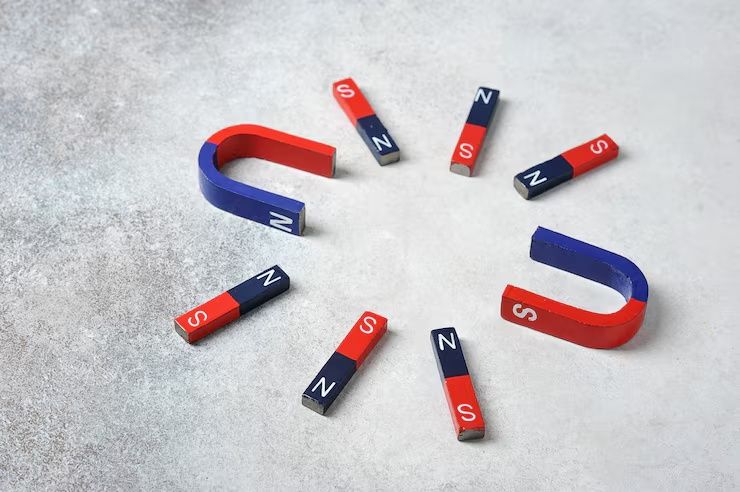Industrial magnets are strong magnetic materials used for lifting, separation, holding or applications in different industries. Unlike everyday magnets, industrial magnets are designed to handle heavy operations and extreme conditions. They are important in areas such as production, recycling, motor vehicle, electronics and construction.
These magnets consist of materials such as neodimium, ferrite or aliko, and offer each unique power, durability and temperature resistance. They can be integrated into machines or used as a standalone tool to adapt industrial processes.

Importance
Industrial magnets play an important role in modern industry for many reasons:
Efficiency in handling material - magnet streamlined lifting, sorting and moving metal parts.
Safety growth - they reduce manual handling of heavy metal objects and reduce workplace damage.
Recycling and waste management skills each differ ferrous metals from non-metal materials.
Automation support - integrated into assembly line and carriers, integrated, magnets increase productivity.
Specific applications - used in sensors, engines, magnetic clamps and filtration systems.
From operational efficiency to environmental stability, industrial magnets are indispensable in many uses.
Types of industrial magnets
Industrial magnets vary by materials and applications:
Permanent magnets - made of neodimium, ferrite or aliko; Maintain a constant magnetic field.
Electromagnets - powered by power; By offering flexible controls, it can be turned on or closed.
Magnetic separators - Remove metal contributors from powder, grains or liquids.
Lifting magnets - heavy metal plates, pipes and scrap material were designed to solve safely.
Magnetic sensor - Find metal products or monitor mechanical operations.
Advanced designs can add many types to increase performance in specific industrial surroundings.
Newer updates and trends (2024–2025)
Industrial magnets continue to develop to meet modern requirements:
Allow more compact and effective high strength design neodiummium magnet-machinery.
Environmentally friendly production-new production procedures reduce the environmental impact and energy consumption.
Integration with automation - smart sensors and electromagnets increases the accuracy of robotics and assembly line.
Recycling of innovation - Advanced magnetic parts improve the recovery rate for iron metals in recycling functions.
The temperature -resistant magnetic content is now facing industrial processes with high heat, which increases the life.
These trends indicate a step towards high efficiency, smart operations and sustainable industrial practice.
Laws and regulations
Industrial magnets are subject to safety and operating rules:
Security standards in the workplace - guidelines ensure safe handling and installation of strong magnets to prevent accidents.
Electricity Compliance - Electromagnets shall meet the rules of electrical safety.
Environmental standards - magnetic production and disposal must follow local environmental regulations.
Import/export rules - some magnetic materials may have restrictions due to industrial or defense applications.
Compliance ensures safe, efficient and legal responsible use in the industrial environment.
Tools and resources
Resources and equipment support efficient use of industrial magnets:
Technical Manual - Provide specifications, handling instructions and maintenance guidelines.
Design Software - CAD program engineers allow the magnets to accurately integrate into machines.
Test equipment - Gauss - meters measure the strength of the magnetic field for quality assurance.
Industry publication - provide insight into new materials, applications and best practices.
Training workshops - Teach Safe Action, Installation and Operational Technology.
These resources increase understanding, application and ensure security when using industrial.
Frequently requested questions
What are business magnets?
Magnets are mainly designed for heavy or unique packages in industries which include creation, recycling and electronics.
Where are they typically used?
In many commercial areas that are growing, isolating, conserving, sensing and filtering operations.
What type of business magnets are present?
Permanent magnets, electromagnets, magnetic separators, raised magnets and magnetic sensors.
How do you take care of commercial magnets effectively?
Use protective device, comply with the handling protocol and make sure proper installation to prevent accidents.
Can business magnets be used at excessive temperatures?
Yes, some substances consisting of excessive fine neodimium or alico magnets are designed to withstand excessive temperatures.
Conclusion
Industrial magnets are crucial equipment that growth performance, safety and innovation in different industries. By knowledge their sorts, programs and current technical trends, agencies can adapt to operations and make a contribution to everlasting practice. With proper handling, regulatory compliance and use of available resources, industrial magnets are nevertheless an critical aspect of modern industrial systems.